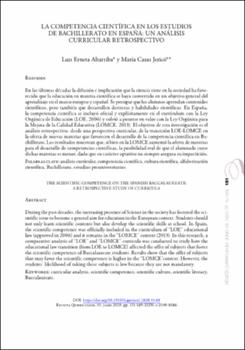La competencia científica en los estudios de Bachillerato en España: un análisis curricular retrospectivo
Fecha
2020Resumen
En las últimas décadas la difusión e implicación que la ciencia tiene en la sociedad ha favo-
recido que la educación en materia científica se haya convertido en un objetivo general del
aprendizaje en el marco europeo y español. Se persigue que los alumnos aprendan contenidos
científicos, pero también que desarrollen destrezas y habilidades científicas. En España,
la competencia científica se incluyó oficial y explícitamente en el currículum con la Ley
Orgánica de Educación (LOE, 2006) y volvió a ponerse en valor con la Ley Orgánica para
la Mejora de la Calidad Educativa (LOMCE, 2013). El objetivo de esta investigación es el
análisis retrospectivo, desde una perspectiva curricular, de la transición LOE-LOMCE en
la oferta de nuevas materias que favorecen el desarrollo de la competencia científica en Ba-
chillerato. Los resultados muestran que, si bien en la LOMCE aumentó la oferta de materias
para el desarrollo de competencias científicas, la posibilidad real de que el alumnado curse
dichas materias es menor, dado que su carácter optativo no siempre asegura su impartición. During the past decades, the increasing presence of Science in the society has fostered the sci-
entific issue to become a general aim for education in the European context. Students should
not only learn scientific contents but also develop the scientific skills at school. In Spain,
the scientific competence was officially included in the curriculum of “LOE” educational
law (approved in 2006) and it remains in the “LOMCE” context (2013). In this research, a
comparative analysis of “LOE” and “LOMCE” curricula was conducted to study how the
educational law transition (from LOE to LOMCE) affected the offer of subjects that foster
the scientific competence of Baccalaureate students. Results show that the offer of subjects
that may favor the scientific competence is higher in the “LOMCE”context. However, the
students’ likelihood of taking these subjects is low because they are not mandatory.





